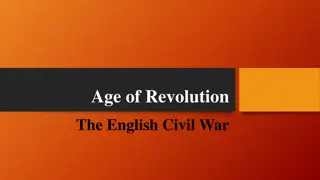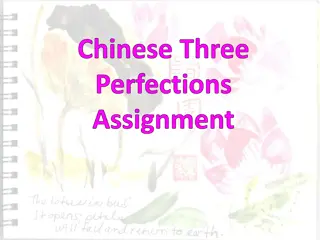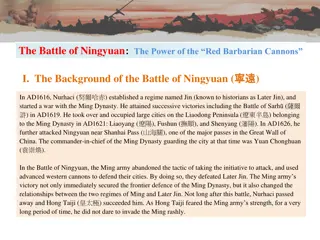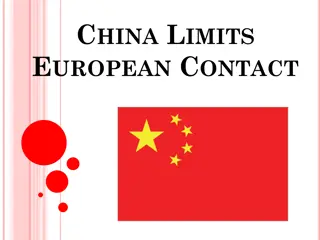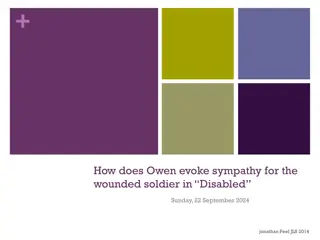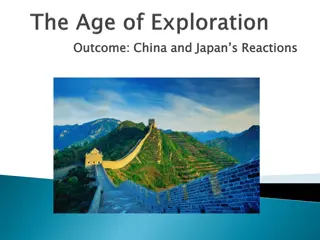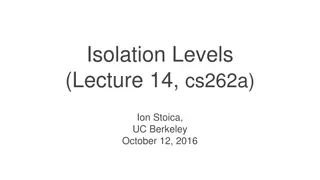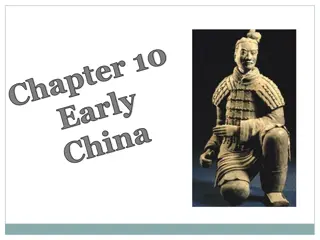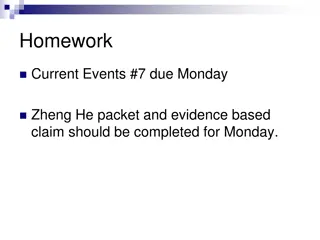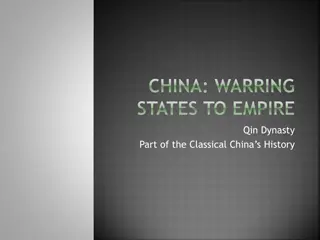Exploration and Isolation: Ming Dynasty's Impact
Ming Dynasty of China, under rulers like Yonglo and Zheng He, embarked on significant exploratory voyages to Southeast Asia, India, Arabia, and eastern Africa. These voyages showcased Chinese superiority through massive fleets and distribution of gifts. However, internal pressures led to the end of these expeditions, and China turned towards self-sufficient isolation, though trade continued covertly, impacting global commerce with the exchange of valuable goods for silver. The Ming Dynasty's actions shaped both exploration and isolation in Chinese history.
Uploaded on Oct 04, 2024 | 1 Views
Download Presentation

Please find below an Image/Link to download the presentation.
The content on the website is provided AS IS for your information and personal use only. It may not be sold, licensed, or shared on other websites without obtaining consent from the author.If you encounter any issues during the download, it is possible that the publisher has removed the file from their server.
You are allowed to download the files provided on this website for personal or commercial use, subject to the condition that they are used lawfully. All files are the property of their respective owners.
The content on the website is provided AS IS for your information and personal use only. It may not be sold, licensed, or shared on other websites without obtaining consent from the author.
E N D
Presentation Transcript
Ming Dynasty Ming rulers would not allow outsiders from distant lands to threaten the peace and prosperity they had brought to China after the end of Mongol rule. Mongols had been a foreign group that invaded China and now finally an ethnically Chinese dynasty was in power.
Ming Dynasty Continued Yonglo son of 1stMing Emperor Had strong interest in exploring the world Mongols had been a foreign group that invaded China and now finally an ethnically Chinese dynasty was in power.
Zheng He Zheng He led these voyages! Early voyages set out to Southeast Asia and India Later expeditions roamed as far as Arabia and eastern Africa. Later expeditions went to Arabia and eastern Africa
Zheng He 40 to 300 ships sailed in each exploration Fighting ships, storage vessels, and huge treasure ships up to 440 feet long Crews outnumber 27,000 on some voyages Sailors, soldiers, carpenters, interpreters, accountants, doctors, and religious leaders Sailed from port to port along the Indian Ocean Distributed gifts, such as gold, silver, silk, and scented oils, to show Chinese superiority More than 16 countries sent tribute to the Ming Court
And then. Chinese scholar-officials complained that these voyages wasted valuable resources After the 7thvoyage ended in 1433, there were no more. China withdrew itself into self-sufficient isolation.
Isolation To keep the influence of outsiders to a minimum, only the government was to conduct foreign trade, through three coastal ports. In reality, trade flourished up and down the coast Profit-minded Chinese merchants smuggled cargoes of silk, porcelain, and other valuable goods out of the country into the hands of eager European merchants Europeans would pay for these goods with the silver that had been mined in the Americas at the expense of Native Americans
Effects China did not become fully industrialized for 2 reasons The whole idea of commerce offended Chinese Confucian beliefs. Merchants, it was said, made their money supporting foreigners and robbery Second, Chinese economic policies traditionally favored agriculture. Taxes on agriculture stayed low. Taxes on manufacturing and trade skyrocketed.
Cultural Diffusion! Accompanying European traders into China were Christian missionaries. Brought Christianity and variety of European inventions, like the clock and prism to China. Many educated Chinese opposed Christianity First missionary was Italian Jesuit, Matteo Ricci. He gained special place in Ming Court through his intelligence and ability to speak and write Chinese.

 undefined
undefined



























